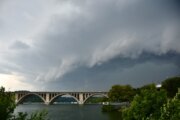NEW DELHI (AP) — For the first time since Prime Minister Narendra Modi’s Bharatiya Janata Party swept to power in 2014, the party did not secure a majority on its own in 2024 national election. But the prime minister’s coalition is still expected to run the country for another five years.
Modi’s allies generally support pro-Hindu legislation, but making new policies could be complicated by coalition politics and a slimmer majority.
Despite a setback, many of the Hindu nationalist policies he’s instituted over the last 10 years remain locked in place:
Here is a look at some of these:
KASHMIR’S LOST SPECIAL STATUS
Soon after winning a second term in 2019, the Modi government stripped the special status of the disputed region of Jammu and Kashmir. Since 1954, the Muslim-majority region had been semi-autonomous, with a separate constitution and inherited protections on land and jobs.
The region is now run by unelected government officials and has lost its flag, criminal code and constitution.
The move divided the region into two federal territories, Ladakh and Jammu-Kashmir, both ruled directly by the central government. It was the first time in the history of India that a was downgraded from statehood to a federally administered territory.
That decision now seems to be irreversible, with India’s top court in December upholding the move, ruling that the region’s special status had been a “temporary provision.”
The Supreme Court said the government has promised to restore Jammu-Kashmir’s statehood and should do so as soon as possible. Ladakh, however, will remain a federal territory. The court also ordered the country’s election commission to hold legislative polls in the region by Sept. 30.
A CONTROVERSIAL TEMPLE ON THE SITE OF A RAZED MOSQUE
In January, Modi inaugurated a grand temple to the Hindu god Lord Ram in the northern city of Ayodhya, considered to be the god’s birthplace.
The temple was built on the site of a 16th-century mosque torn down by Hindu mobs in 1992, sparking riots in which nearly 2,000 people were killed.
Built at an estimated cost of $217 million and spread over nearly 3 hectares (7.4 acres), the temple stands on a site that has long been a religious flashpoint for the two communities.
The Modi government says the dispute ended in 2019 when India’s Supreme Court called the mosque’s destruction “an egregious violation” of the law but granted the site to Hindus while giving Muslims a different plot of land.
Hindu hardliners are now eyeing two other mosques that they claim were built on the site of demolished Hindu temples, but a law protects monuments built before the British granted independence to India in 1947 and the opposition is likely to put up a stiff fight if the government seeks to change it.
CITIZENSHIP FOR NON-MUSLIMS
Just weeks before the election, Modi’s government started implementing a 2019 citizenship law the extends citizenship to almost many refugees while barring Muslims
The law provides a fast track to naturalization for Hindus, Parsis, Sikhs, Buddhists, Jains and Christians who fled to Hindu-majority India from Afghanistan, Bangladesh and Pakistan before Dec. 31, 2014. It excludes Muslims, who are a majority in all three nations.
Opposition-ruled states like West Bengal and Kerala have said they would not implement the law, as they consider it to be discriminatory.
However, the Modi government started distributing citizenship certificates to non-Muslim migrants as the voting started in the national election.
The law was approved by the Indian Parliament in 2019, but Modi’s government delayed its implementation after deadly protests broke out in capital New Delhi and elsewhere. Scores were killed during days of clashes.
___
A previous version of this story incorrectly stated that Jammu and Kashmir had been semi-autonomous since 1957. The correct year is 1954.
Copyright © 2024 The Associated Press. All rights reserved. This material may not be published, broadcast, written or redistributed.







